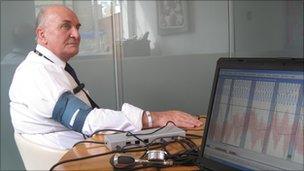The truth about politics: MP takes lie-detector test
- Published

Ask the public about the honesty of MPs and the typical knee-jerk response is that you cannot believe a word a politician says. But what if that politician is strapped to a polygraph?
The question seems less academic as I sit watching the Labour MP for Ealing North, Stephen Pound, having pneumatic breathing tubes and monitoring sensors attached to his chest and arm.
The shadow minister for Northern Ireland, who served in the Merchant Navy and worked as a bus conductor and hospital porter before becoming an MP in 1997, has gamely agreed to undergo a lie-detector test to show that MPs can be trusted.
The questions being put to Pound are:
- Have you ever discussed with a fellow MP that Labour leader Ed Miliband was not the right man for the job?
- Have you ever submitted expenses which you knew were outside the parliamentary rules?
- Have you ever been offered any favours or fee to break the rules of the UK?
By their nature, the questions have to refer to events which have or have not happened - rather than seeking an opinion.
The man rigging up the polygraph - which would not be admissible in a UK court - is Don Cargill, chairman of the British and European Polygraph Association.
"When a person tells a lie their heartbeat physically increases," he says.
"And because the heart beats faster when a person tells a lie, it increases the blood pressure. When you tell a lie you also sweat more - we've discovered that your breathing pattern alters as well."
He is more accustomed to testing prospective nannies and potential philanderers.
"I've tested just about everything else apart from a politician. I'm looking forward to testing Stephen."
With the heart rate, blood pressure and sweat gland monitors attached, Cargill is left alone in the room with the politician to complete the polygraph. The presence of anyone else could, we are told, undermine the controlled conditions.
Following an hour of intense questioning - much of it just to prepare the ground for our three questions - we are beckoned back in for the results.
The MP had answered "no" to the questions - denying that he had ever fiddled expense, taken bribes or discussed that Ed Miliband was not up to the leadership job.
'Murky area'
But was he telling the truth?
It seems so. "I am glad to give a diagnostic decision of no deception indicated," reveals Cargill.
Despite being found to be honest in his answers, Pound says it was a challenging process to go through: "Anyone would feel defensive under this."
"What went through my mind was the strange combination of the scientific and the analytic, Freud with a screwdriver."
"This is bringing science into a very murky area.
"Stop anyone in the street and ask who is the least trustworthy creature and it'll be a politician.
"I'm kind of inured to not being believed because most of us aren't believed. So I'm pretty relieved to be honest."
However, another interesting truth was revealed by the polygraph.
When asked if he had ever taken any bribes, Mr Pound revealed that he has "frequently" been asked "to fiddle housing allocations and school admissions".
He says that on "about ten" occasions over the last decade, constituents have offered him cash - sums ranging from £50 to £200 - to bend the rules.
He is swift to confirm he has never taken advantage of such offers: "I explained to them very, very carefully that I can't do that, it's not going to advance their cause in any way, and for all I know they could be setting me up."
So the potential for dishonesty appears to run both ways. Perhaps because politicians are so little trusted, some people assume they will be corruptible.
Having endured the polygraph, the Labour MP can see a role for deploying lie-detectors as a means to help restore the public's faith in politicians.
"I think an annual polygraph test for MPs would be a damn good thing - it would actually show that we're willing and keen to do it."
Beyond Westminster is on BBC Radio 4 on Saturday 27 August at 11:00 BST. Listen again via the BBC iPlayer or download the programme podcast.
- Published17 August 2011
- Published14 January 2011
- Published6 April 2010